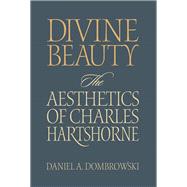Divine Beauty
, by Dombrowski, Daniel A.- ISBN: 9780826514400 | 0826514405
- Cover: Hardcover
- Copyright: 3/1/2004
Considered by many to be one of the greatest philosophers of religion and metaphysicians of the twentieth century, Charles Hartshorne (1897–2000) addressed questions of aesthetics throughout his long career. Yet his efforts in this area are perhaps the most neglected aspect of his extensive and highly nuanced thought.Divine Beautyoffers the first detailed explication of Hartshorne's aesthetic theory and its place within his theocentric philosophy.As Daniel A. Dombrowski explains, Hartshorne advanced a neoclassical or process theism that contrasted with the "classical" theism defended by traditionalist Jews, Christians, and Muslim believers. His conception of God was dipolar, which could attribute to God certain qualities that traditionalists would exclude. For example, in Hartshorne's view, God can embrace excellent aspects of both activity and passivity, or of permanence and change; classical theists, on the other hand, exclude passivity and change from their conceptions.Dombrowski goes on to explain the ramifications of Hartshorne's view of God for aesthetics, which for him had both broad and narrow meanings: all sensory feeling or sensation, in the broad sense, and a disciplined feeling for beauty, in the narrow sense. Included are discussions on Hartshorne's famous appreciation for the aesthetics of bird song; his view of beauty as a mean between two sets of extremes; his idea of the aesthetic attitude, which concentrates on values that are intrinsic and immediately felt; and the place of death in his aesthetics, in which the value of our lives consists in the beauty or intensity of experience that we contribute to the divine life.Filling an important gap in our understanding of Hartshorne,Divine Beautyalso makes a persuasive case for the superiority of his neoclassical theism over classical theism.







